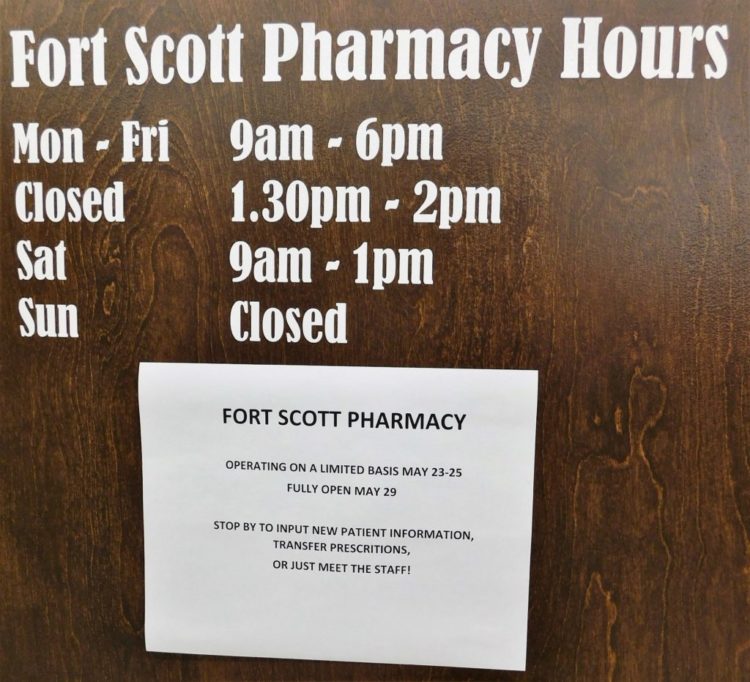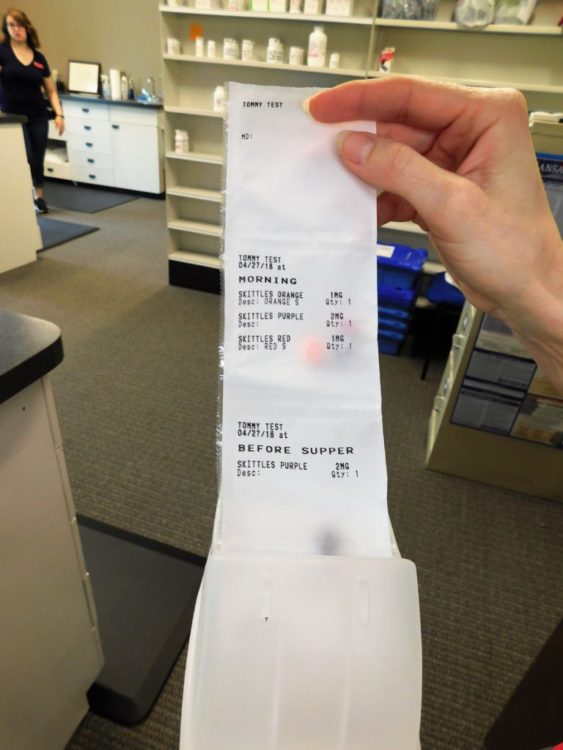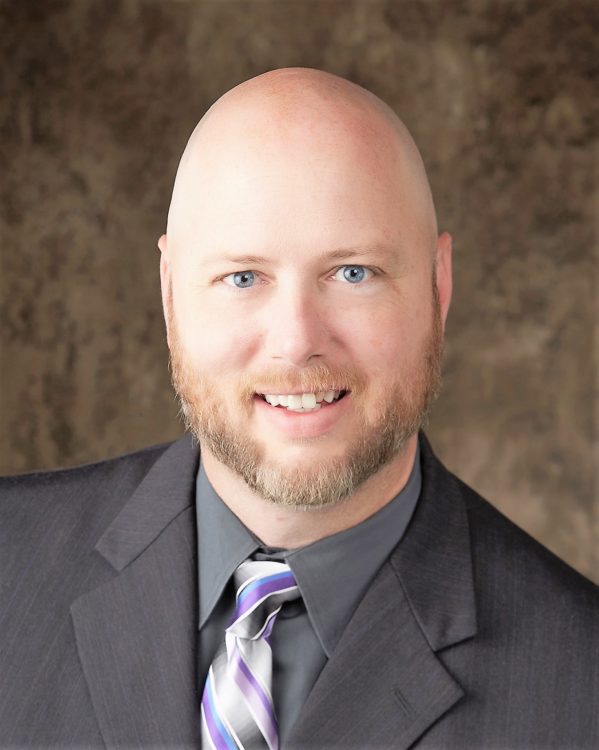The Bourbon County Sheriff’s Office daily reports can best be viewed on a computer.
The office can be reached at (620) 223-2380.
Click here, then click on the image to enlarge it:

Fort Scott Pharmacy, located in the northeast corner of Price Chopper Grocery Store at 2322 S. Main, Suite B, is open for business as of today, May 29. The phone number is 620-644-9444.
Hours of the pharmacy: 9 a.m. to 6 p.m. Monday through Friday; closed from 1:30 to 2 p.m. Saturday 9 a.m. to 1 p.m. Closed on Sunday.

Julie Pellett, one of two pharmacists, worked as the inpatient pharmacist for Mercy Hospital for 16 years.
Taylor Cation, a 2012 graduate of Fort Scott High School and most recently from Kansas University with a degree in pharmacy in 2018, is the second pharmacist.
“Taylor shadowed us at Mercy,” Pellet said. “She was one of my favorite students to do that.”
“I’ll do my boards this summer, by the middle of July I’ll know my results,” Cation said.
Ashley Shelton is the pharmacy technician, with eight years experience working for the former Woods Supermarket pharmacy as a technician.
The pharmacy is located inside the grocery store and has a drive-through window on the north.

“We offer personalized care, more flexibility, competitive pricing and friendly service,” Pellet said.
“We offer compounding more than other chain stores,” she said.
Other services:

“Stop by to input new patient information, transfer prescriptions or just meet the staff,” Pellett said.
The pharmacy doesn’t sell over the counter medicines, but can assist and advise the public on purchasing the right product, she said.
“However we don’t sell them through the pharmacy,” Pellett said.
The Iola Pharmacy Group is the owner of the pharmacy.
“They’ve been a retail pharmacy for over 40 years,” she said. “We are the only independent pharmacy in Bourbon County.”
The pharmacy has a lease agreement with Price Chopper, she said.
“We are excited to launch our business, “Pellett said. “We’ll be in the Good Ol’Days parade (to let people know they are in business).
Submitted by Jackie Warren, co-superintendent for Open Class at the Bourbon County Fair which starts July 10.

It seems like the fair comes earlier and earlier each year. July is coming fast but there is still time to have your projects ready to be entered in the fair.
There are several new categories this year in the open class quilting section.
Be sure and notice classes 26 through 30 in the Fair paper, open class quilting section.
Class 26 is “mug rug”. Mug rugs are a size halfway between a coaster and a placemat. A neat project to set your drink cup and a cookie.
Class 27 that has been added is “Hexagons (any size). Projects with “hexies” have become very popular so bring your “hexie” project.
Any quilted holiday item can be entered in Class 28.
Wool applique has also become very popular also and can be entered in Class 29.
Class 30 is a “Quilt on a Stick”. This will be a fun entry and was noted at the 2017 Kansas State Fair. Make a quilt block 8 x 8 (any pattern) finished, can be pieced or appliqued. The stick and “vase” will be provided for you.
This year the Table Runner Contest is a Polka Dotty Posies pattern that can be obtained from Jackie Warren, 224-8161. Use spring colors and polka dots. The first-place winner will receive $50.
Adults will be baking Easy Cinnamon Bread for the King Arthur Flour contest. 12 years old and younger will be baking Chewy Brownies.
Please contact Joyce Gobl (223-1964) for further information and instructions to obtain your recipes and King Arthur Flour. Prizes are donated by King Arthur Flour Company.
Anyone can enter the Hay Bale and/or the Traditional Scarecrow Contests.
This can be a fun project for groups, businesses, families or individuals. Great prizes for these categories. Contact Terri Williams (215-3202) for more information. Hay bales will be provided for you with registration.
Exhibits can be entered on Monday, July 16, 2 pm – 8 pm.
The judging is Tuesday morning, July 17.
On Wednesday, July 18, the Starlite FCE and Thursday Night Live FCE will each be presenting a special program.
2 pm will be “Show Me the Power of Healing Foods” and 3 pm will be “Kids in the Kitchen”.
The 2018 Bourbon County Fair – Open Class – is a fun and busy time for the volunteers who organize and keep the many exhibits displayed for your viewing. If you have any questions, please contact Jackie Warren (224-8161) or Terri Williams )215-3202). Come and enjoy the fair!
Agenda
Bourbon County Commission Room
2nd Floor, County Courthouse
210 S. National Avenue
Fort Scott, KS 66701
Tuesdays starting at 9:00
Date: May 29, 2018
1st District-Lynne Oharah Minutes: Approved: ____________
2nd District-Jeff Fischer Corrected: _______________
3rd District-Nick Ruhl Adjourned at: _______________
County Clerk-Kendell Mason
9:00- 9:45 Jim Harris
10:00-10:15 Public Hearing- regarding County-wide NRP
12:00- 1:30 Commissioners gone to Lunch
1:30- 1:45 Lora Holdridge- Register of Deeds Budget 2019
2:00-2:30 Annual Reports- Township, Fire District, Cemetery, Lighting District & Watersheds
2:30-2:45 David Neville- surplus furniture
2:45 Employee Handbook
Justifications for Executive Session:
Personnel matters of individual non-elected personnel
Consultation with an attorney for the body or agency which would be deemed privileged in the attorney-client relationship
Matters relating to employer-employee negotiations whether or not in consultation with the representative(s) of the body or agency
Confidential data relating to financial affairs or trade secrets of corporations, partnerships, trusts and individual proprietorships
Preliminary discussions relating to the acquisition of real property
Matters relating to the security of a public body or agency, public building or facility or the information system of a public body or agency, if the discussion of such matters at an open meeting would jeopardize the security of such public body, agency, building, facility or information system

Summer Slump will soon be upon us
During the summer in southeast Kansas cattle on cool season fescue grass pastures may tend to perform poorly. Often times, this is due to summer slump, otherwise known as fescue toxicosis. The fescue grass plant contains an endophyte (fungus). This endophyte helps make the plant hardy, but it also produces a chemical (alkaloid) that can cause negative effects in cattle, if eaten in high doses.
Symptoms of summer slump include poor hair coat, elevated body temperatures, feet problems (fescue foot), and poor breeding rates. While these symptoms can affect all cattle, it is most generally noticed in black hided cattle.
Summer slump increases core body temperatures. Affected cattle spend the majority of their time in ponds or in under shade, rather than grazing in the pasture. Some strategies to mitigate the effects of summer slump include feeding a good mineral supplement (specifically formulated for use on fescue pastures), culling poor performers from the herd, and providing alternative feed sources.
For more information on fescue and its effect on cattle, contact me a (620)-223-3720 or by e-mail at [email protected].

If one is looking for a relaxing evening with friends or family, the Bourbon County Arts Council (BCAC) Art Walk is an option.
From 5-8 p.m. Friday, May 25, the art walk will be located at the Liberty Theater Patio, 113 S. Main. In case of inclement weather, the event will be moved to the office lobby just south of Crooner’s Lounge, next door to the Liberty.
Food and drink may be purchased at Crooner’s Lounge and delivered to the patio.
The patio event is intimate and relaxing, Deb Anderson, president of the BCAC, said.
“The artists feel more comfortable with that environment,” Anderson said.

Artists who are scheduled this evening are Paul Milks, photographer, Fort Scott; Bobbie Kemna, potter, Fort Scott; Carleen Shatto, maker of handmade soaps, Drexel, M0; Mindy Bartlett, jewelry maker, Fort Scott; Sandy Smith, potter, Fort Scott; Lucy Gladbach, painter, Missouri; Ken Anderson, elk antler decor, Fort Scott; Dee Ann Davis, cut coin pendant creator, Fort Scott and Toni Thornton, maker of dream catchers, Fort Scott.

Any artist interested in showcasing their artwork can call Anderson at 620-223-8650 before 2 p.m. today to reserve a table to sell their wares, she said.
The BCAC is hosting four Art Walks this summer, whose purpose is to showcase local artists, Anderson said.
They will all be Friday evenings at the Liberty Theatre Patio: June 15, July 27 in collaboration with Mercy’s Wine Stroll, and September 14.
“August is just too hot to have it,” Anderson said.
Additionally, the BCAC is sponsoring music concerts at 8 p.m. at the Liberty Theater Patio on June 23-featuring Ben Taddiken, July 14-The Whiskey Raccoons, August 18-Flagship Romance.
The 12-member board of the BCAC consists of Anderson, Terri Floyd, Deb Halsey, Elaine Buerge, Bre Martin, Laura Meeks, Tedena Tucker, Ray Streeter, Danny Magee, Rob Shaw and Chris Woods.
Membership is currently at 103, she said.
They meet at 6 p.m. the second Monday of each month at Presbyterian Village’s Community Room.
The BCAC’s mission is to promote and expand the arts in Bourbon County, Anderson said.
There will be four, free movies for family entertainment this summer at the City Park just south of the Lowell Milken Center at Wall and Main streets downtown.
The first one is The Incredibles sponsored by Bids and Dibs and also Fort Scott Family Dental. The movie will start at 8:30 p.m. on May 25. In case of inclement weather, the movied will be moved to Memorial Hall.
Free popcorn and drink will be available.
The event is facilitated by the Fort Scott Convention and Visitors Bureau. Check out the website at http://www.visitfortscott.com
New entertainment acts and hours of the street dance are what’s different this year at the 37th Annual Good Ol’ Days Festival May 31 through June 2.
The theme this year is “Fins, Feathers, and Furs”.
“The street dances will be from 7 to 10 p.m., with the carnival and beer tent open until 11,” Kellye Barrows, vice chairman of the festival’s board, said.
Formerly the dance went until 11 p.m. but the new time will allow people to leave more leisurely, Barrows said.
For all performances at Skubitz Plaza bring a lawn chair. No coolers or glass containers are allowed. And no pets, please.
Performing on Skubitz Plaza for the street dance on Friday, June 1 is Shades of Blue, from Kansas City. These five young musicians share a love of blues and rock and roll, according to information provided.
Check out their website at www.shadesofbluekc.comhttp://www.shadesofbluekc.com
Also on Friday night, the street fair and marketplace on North Main Street will be open from 5 to 10 p.m.
Wade Henry, “entertainer extraordinaire”, according to Barrows will perform Saturday morning from 10-11 a.m. and again 1-2 p.m. at Skubitz Plaza. Henry is a juggler, unicyclist, ropewalker, fire eater, equilibrist, magician, speaker and comic.
Check Henry’s website at http://www.wadehenryshow.com/
Saturday evening, from 3 to 6 p.m. Stone Country, a country-western band from Girard will perform at Skubitz Plaza. The group is comprised of Shana Lynette Stone, Dan Duling, Jeff Culver, Rick Eaves, Rick Duling and Fort Scott native, Jason Richison.
Check out its Facebook page at https://www.facebook.com/Stone-Country-179892725724073/
Saturday night from 7 to 10 p.m. The Brent Giddens Band, Cleveland, Okla. will perform a wide variety of cover songs from multiple genres.
Check the band out on its website: www.brentgiddens.com
From 9 a.m. to 6 p.m. Saturday, June 2 the 2nd Annual BBCO Outdoor Expo will be located from 1st to 3rd streets on North Main Street.
Adam LaRoche, Buck Commander, and Duck Commander are partnering for this event. A full schedule of events will be available at the festival.
Activities At The Fort
Fort Scott National Historic Site will be featuring presentations on canoeing/kayaking and youth archery instruction provided by the Kansas Dept. of Wildlife, Parks, and Tourism from 10 a.m. to 4 p.m. Additionally there will be a broad-ax/hewing carpenter display by Jim Bailey with the National Park Service.
From 10 a.m. to 3 p.m. live birds of prey will be on display by Operation WildLife at the fort.
A story-time will be provided by Steve Otto from 10 a.m. to 2 p.m.
Bring a blanket for an old-fashioned picnic. Visit the food booths downtown, then bring your lunch to the Fort and enjoy some shade, from 11 a.m. to 1 p.m.
An old-fashioned mattress race will be run at the fort from noon to 12:30 p.m.
There will also be a timed visit of “Buddy The Bison.” Buddy Bison will be one of the attractions of Good Ol’ Days at Fort Scott this year and is the grand marshal of the parade.
Check Buddy out:
https://www.nps.gov/fosc/planyourvisit/goodoldays.htm
To get involved with the parade on June 2 click below.
Seeking Good Ol Days Parade Entries
For applications for arts and crafts, food vendors, outdoor expo, talent show and parade, click below.
https://www.fortscottgoodoldays.com/applications.html
Woodson County Extension Council and Woodson County Commissioners have recently voted to join the Southwind Extension District. Woodson County and the Southwind Extension District will be working over the next several weeks to complete requirements for Woodson County to become a part of the district. This merger, effective July 1, 2018, will provide expertise of additional specialized agents in Woodson County. At the same time, personnel in Woodson County will have access to more resources and support as they work together with Southwind District faculty and staff on programs and activities. Extension programming improves the lives of people by providing educational programs related to agriculture, family and consumer sciences, 4-H youth programs and community development backed by the power of applied research from Kansas State University.
“On behalf of the Southwind District Board of Directors, I would like to welcome Woodson County to the District. We are proud to be able to help expand the availability of K-State Research & Extension programming to our neighbors. As well, the addition of new ideas and fresh viewpoints can only improve extension services for the entire district. This is an exciting time for extension in Southeast Kansas!” says Kathy Brazle, Chairman, Southwind District Board of Directors.
In 1991, the Kansas Legislature passed an act permitting two or more County Extension Councils to join and form an extension district. The Extension District Law was designed for efficient and effective programming. In 2010, the Extension Councils Executive Boards and the County Commissioners in Neosho and Allen Counties passed county resolutions to form Southwind Extension District. Bourbon County was added in 2011, and Woodson County will now sign an agreement with the Southwind Extension Board. By joining the Southwind District, Woodson County residents will now have access to 8 agents from all four counties of the expanded district, who offer programming in the areas of Community Development, Forage and Livestock Production, Crop Production, Horticulture, 4-H Youth Development, Financial Management, Adult Development and Aging, and Nutrition, Health, and Food Safety.
“Woodson County residents need a sustainable extension program that improves the lives of our citizens,” according to Jay Weseloh, Woodson County Extension Board Chair. “Joining the Southwind District allows us to expand our programming and reach more people without creating a significant financial burden on our taxpayers.”
Southwind Extension District relies on strong local governance. Extension programs are fiscally-responsible entities that are managed by ordinary citizens who care about making their counties a better place to live. Each county in the extension district is represented by four district governing board members. After initial appointment by their county commissioners in Woodson County, district board members will be elected during fall elections of the alternating odd-numbered years for a four-year term.
“Board members, faculty, and staff are excited about the opportunities of merging together to create a stronger extension district that will be better poised to meet the needs of residents,” concludes Carla Nemecek, Director of Southwind District. “We look forward to working in Woodson County.”